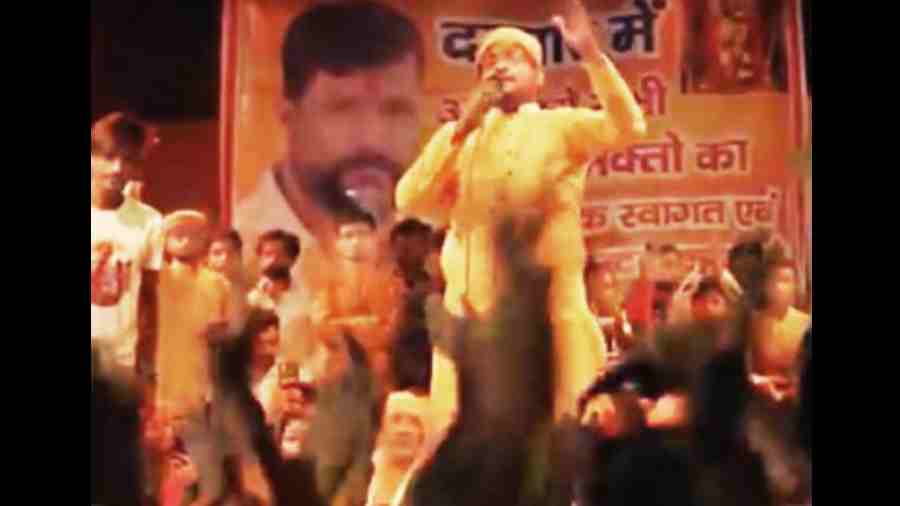A German public broadcaster has come out with a video report on “Hindutva pop” singers who spread hatred against Muslims, days after a BBC documentary put the spotlight on Narendra Modi’s role in the 2002 Gujarat riots and angered the Indian government.
“Those who cast an evil eye on our religion, we gun them down,” goes one of the Hindi songs with which the Deutsche Welle (DW) report begins. Another says: “India is for Hindus, Mullahs go to Pakistan.”
A BJP spokesperson denied any links between her party and the hate-mongering Hindi singers shown and interviewed by the broadcaster. The BJP spokesperson advised those who felt alarmed by such songs, if they were being sung, to “go ahead and file FIRs against those singers”.
Chile’s Villa Grimaldi museum, which documents the atrocities of the Pinochet regime, on Monday commented on the DW report, tweeting: “On January 30, 1948, Gandhi was assassinated by an anti-Muslim far-Right Hindu. Today, 75 years after this event, hatred against Islam is still alive and calling for violence from Hindutva pop songs, the new soundtrack of the anti-Muslim movement in India.”
In the DW report, titled India: Soundtrack of Hate, presenter Akanksha Saxena says: “The rise of Hindutva pop is parallel to the rise of Hindu nationalism in the country in recent years.”
The report alleges that Hindutva pop has encouraged violence against Muslims.
A shop attendant named Rakesh in Ayodhya explains the lurid appeal of Hindutva pop: “When a Hindu listens to the song, a new energy and excitement develops. If you watch something for hours, you feel intoxicated and you will listen to the lyrics and keep them in your heart.”
Indian authorities have so far not reacted to the report. Many Twitter users have, however, expressed fear that it will soon be blocked, citing reports that access to the BBC documentary, India: The Modi Question, has been curbed further by the Centre.
The DW report says some of the Hindutva pop singers, who have been attracting huge crowds in Uttar Pradesh, draw their hate-filled views partly from fake news circulated on WhatsApp.
It suggests that educated but unemployed youth are easily drawn to the politics of hate and form a core audience for Hindutva pop.
The report shows victims of last year’s riots in Khargone, Madhya Pradesh, who allege that hateful Hindi songs directed against Muslims were played at a Ram Navami procession before they were attacked.
The DW report features and interviews two Hindutva pop singers, Sandeep Acharya of Ayodhya and Prem Krishnvanshi of Lucknow.
In the report, Sandeep, who has millions of views on social media, says YouTube has taken down many of his channels for hate speech, adding: “But our reach is very high on the platform. Once it’s taken down I make another channel.”
One of his songs says: “Abdul uncle, you are a tenant in this country; why should we tolerate you?”
He narrates how, when his mother was admitted to hospital in 1985 and needed blood, she told her husband to make sure that the blood did not come from a Muslim. “That’s our DNA,” he declares.
Prem is a postgraduate in computer science who was forced by unemployment to try his hand at music. He says Sandeep is his mentor and helped him see things clearly.
Prem’s friends — part of his fan base — are “educated and currently unemployed due to the dearth of jobs in the market”, says the report. “One theory suggests that this disenchanted youth tends to lean towards divisive politics and Right-wing hate-mongering,” it adds.
Delhi University professor Apoorvanand tells DW: “When such songs are played and tolerated and enjoyed, then young people and not-so-young people think that this is something one can do. Why in imagination, it can be done in reality.”
BJP spokesperson Anila Singh says in the report: “The BJP doesn’t have any space for any sort of hate and we don’t encourage it. If such songs have been sung by certain singers and some people think they are very derogatory and very harmful for peace and harmony of the society, they should go ahead and file FIRs against those singers.”
At the Neelkanth Mahadev Temple in Bhinmal, Rajasthan, on January 27, Uttar Pradesh chief minister Adityanath said in a speech: “Our Sanatan Dharma is India’s national dharma.”












